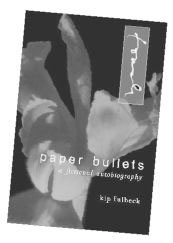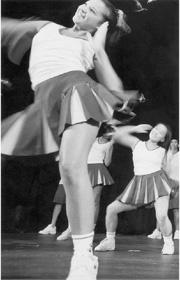PAPER BULLETS by Kip Fulbeck (University of Washington Press, $18.95)
WHAT DO YOU remember when you hear Morrissey sing, “Take me out tonight, where there’s music and there’s people who are young and alive”? For 36-year-old Kip Fulbeck, a professor of art at UC-Santa Barbara, that melancholy tune signifies the loss of his first love. At 16, he was less experienced than his 14-year-old Brooke Shields look-alike girlfriend, and their relationship ended badly, as power struggles usually do.
Paper Bullets, Fulbeck’s autobiographical novel, situates the breakup at a gas station, with Morrissey on the car radio and the author’s younger self crying in front of the girl, who preferred to puff on a cigarette rather than sympathize. Rejected, he’s left as messy as a runny nose. It is one of the many poignant moments in a first novel by an artist who, despite being a successful academic, often comes across as a smart-ass. “I want my work to fuck with the audience,” he once told students during a lecture at the Rhode Island School of Design.
Fulbeck, who’s half-Asian and half-Caucasian, is best known for his videos that tackle Asian Americans’ issues with race. One of his more humorous videos, Asian Studs Nightmare (shown at the Seattle Asian American Film Festival in 1995), combined manipulated television and movie clips with a fast-paced personal monologue to critique a popular TV dating show’s avoidance of miscegenation. The work is ballsy and refreshing compared to the usual stodgy material used to study identity politics. In 10 minutes or less, his videos can crystallize what it means to be a half-white Asian American, an outsider among outsiders.
One Columbia University scholar calls Fulbeck’s art “Hapa rap,” and the term is accurate: He certainly invites the same kind of controversy as many rappers. One hesitates to give credit to a book that sometimes reduces women to the size of their butts or their willingness to perform fellatio, but in the end, Fulbeck wins you over: Just as you start to hate the guy, he makes you laugh.
Paper Bullets, which bears the noncommittal subtitle “a fictional autobiography,” lacks the brevity and assuredness of Fulbeck’s videos, but gives a thorough look into the artist’s motives. Relating the author’s experiences of growing up in a mixed-race household in Covina, Calif., the book delves into a host of complex topics, including interracial dating, the emasculation of Asian men, and the exoticization of Asian women. This is usual territory for readers familiar with the works of Chang-Rae Lee, David Wong Louie, or UW professor Shawn Wong, but Fulbeck offers the often–ignored perspective of being mixed race. Anyone who thinks that biracial kids have it easier is bound to be surprised.
AS A CHILD, Fulbeck is plagued with self-hatred. In an early chapter, he disturbingly describes coming across an issue of Playboy with a Chinese centerfold model. “She had brown nipples. Brown nipples! You gonna chomp on brown nipples? Gross! She’s got that flat Chinese nose and black hair and yellow skin. . . . Enough already. I don’t need to see this.”
While Fulbeck matures and grows more self-accepting, race continues to be a thorny issue. Going through various phases, he first only dates white women, then only Asian women, then tries to date whomever he finds attractive. But a Cambodian friend tells him that if he dates a white woman, people will think he’s choosing his “white side.” Exasperated, he responds, “We all just try to date who we want, but it’s always political on some level.” While he admits that Asian women like him because he’s “white enough to be attractive and Asian enough to pass with their parents,” Asian men give him “attitude” because he represents to them the result of “their” women pairing up with white men.
Race and sex are the primary themes of Paper Bullets, but Fulbeck is just as passionate when speaking on other aspects of his life, such as working as a lifeguard, meeting the parents of a new girlfriend, or relying on the support of good friends. As in his videos, he moves the narrative along by inserting song lyrics and movie dialogues, referencing everyone from the Beach Boys to Ice Cube, from Sylvester Stallone to Akira Kurosawa. Reading Paper Bullets is often like playing pop- culture trivial pursuit, but the book’s overall effect is surprisingly soothing, giving buoyancy and universality to stories that are deeply personal.







